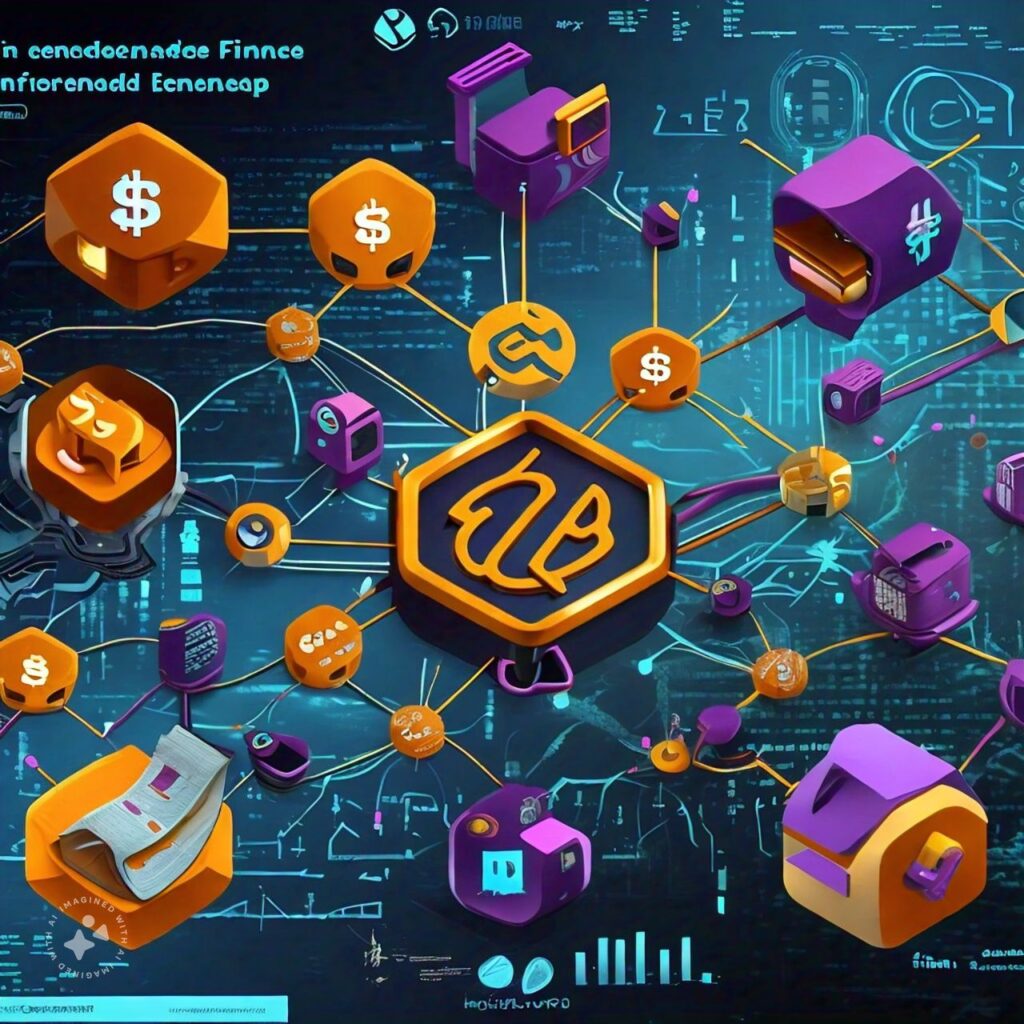Introduction to Decentralized Finance (DeFi)
The world of finance is undergoing a radical transformation, and at the forefront of this change is Decentralized Finance, more commonly known as DeFi. DeFi represents a broad category of financial applications in cryptocurrency or blockchain designed to disrupt and replace traditional financial intermediaries. Unlike traditional banking systems, which rely on centralized entities such as banks and financial institutions, DeFi operates on decentralized networks, typically built on blockchain technology. This revolution is opening up a world of possibilities, where financial services are more accessible, transparent, and inclusive.Decentralized finance
The Genesis of DeFi
To truly understand DeFi, it’s essential to grasp the historical context that led to its emergence. The global financial crisis of 2008 exposed the vulnerabilities and inefficiencies of the traditional financial system, highlighting the need for alternatives. This crisis laid the groundwork for the creation of Bitcoin by an anonymous entity known as Satoshi Nakamoto in 2009. Bitcoin was the first successful application of blockchain technology, offering a decentralized form of digital currency. However, it wasn’t until the advent of Ethereum in 2015, with its programmable smart contracts, that the foundation for DeFi was truly established. Ethereum allowed developers to build decentralized applications (dApps) that could automate and facilitate complex financial transactions without intermediaries.Decentralized finance
How DeFi Works: The Building Blocks
DeFi operates on blockchain technology, with Ethereum being the most commonly used platform due to its robust infrastructure and active developer community. At the heart of DeFi are smart contracts—self-executing contracts where the terms of the agreement are written directly into code. These contracts run on blockchain networks, ensuring that transactions are immutable and transparent. The absence of intermediaries means that transactions are faster, cheaper, and more secure. DeFi applications are built using a combination of various protocols and tools, including decentralized exchanges (DEXs)Decentralized finance

Key Components of the DeFi Ecosystem
The DeFi ecosystem is vast and continuously evolving, but several key components are foundational to its operation:
- Decentralized Exchanges (DEXs): Unlike traditional exchanges, DEXs allow users to trade cryptocurrencies directly with one another without the need for an intermediary. Examples include Uniswap, Sushiswap, and PancakeSwap. These platforms use liquidity pools, where users provide liquidity in exchange for a share of the trading fees.
- Lending and Borrowing Platforms: Platforms like Aave, Compound, and MakerDAO allow users to lend their cryptocurrencies to others in exchange for interest or to borrow assets by providing collateral. These platforms operate through smart contracts, ensuring that the terms of lending and borrowing are automated and transparent.
- Stablecoins: Stablecoins are cryptocurrencies pegged to the value of a traditional currency, usually the US dollar. They provide a stable medium of exchange within the volatile cryptocurrency markets. Examples include USDT (Tether), USDC (USD Coin), and DAI (a decentralized stablecoin from MakerDAO).
- Liquidity Pools and Yield Farming: Liquidity pools are a collection of funds locked in a smart contract, providing liquidity to decentralized exchanges. Yield farming involves users earning rewards by providing liquidity to these pools, often in the form of interest or additional tokens.
- Insurance Protocols: DeFi insurance platforms like Nexus Mutual provide coverage against risks in the DeFi space, such as smart contract failures or exchange hacks. These protocols operate on a decentralized model, where the community decides on claims and payouts.
Advantages of Decentralized finance
DeFi is not just a buzzword; it offers tangible benefits that are transforming the financial landscape:
- Accessibility: DeFi platforms are open to anyone with an internet connection, removing barriers associated with traditional banking, such as credit checks, minimum balances, or geographic restrictions. This inclusivity is particularly beneficial for individuals in developing countries who lack access to formal financial services.
- Transparency: All transactions on DeFi platforms are recorded on a public blockchain, providing unparalleled transparency. Users can verify the integrity of their transactions, and the open-source nature of DeFi projects allows for continuous auditing by the community.
- Control and Ownership: DeFi gives users full control over their assets. Unlike traditional banking systems where the bank holds custody of funds, in DeFi, users retain ownership through private keys. This reduces the risk of funds being frozen or confiscated by centralized entities.
- Efficiency and Cost-Effectiveness: By eliminating intermediaries, DeFi transactions are faster and often cheaper than traditional financial services. For instance, sending money across borders can be done in minutes rather than days, with significantly lower fees.
- Innovation and Flexibility: The DeFi space is rapidly evolving, with new projects and protocols emerging constantly. This innovation fosters a dynamic environment where users can find tailored financial products that meet their specific needs, whether it’s earning interest, trading, or borrowing.
Risks and Challenges in the Decentralized finance
While DeFi offers numerous advantages, it’s important to recognize the risks and challenges associated with this emerging field:
- Smart Contract Vulnerabilities: Since DeFi operates on smart contracts, any bug or vulnerability in the code can be exploited, leading to significant financial losses. While many projects undergo rigorous audits, the risk of unforeseen flaws remains.
- Regulatory Uncertainty: The decentralized nature of DeFi presents challenges for regulators worldwide. Without clear regulations, there is uncertainty about how DeFi will be governed, which could impact its growth and adoption.
- Market Volatility: The cryptocurrency market is known for its extreme volatility. While stablecoins mitigate this risk to some extent, the overall DeFi ecosystem remains susceptible to sharp price fluctuations, which can affect the value of assets and the stability of lending protocols.
- Scams and Fraud: The openness of DeFi also means it’s fertile ground for scams and fraudulent projects. Without a centralized authority to vet projects, users must exercise caution and conduct thorough research before engaging with new platforms.
- Liquidity Risks: Yield farming and liquidity provision can be lucrative, but they also come with risks, such as impermanent loss, where the value of assets in a liquidity pool diverges from their value if held separately.
The Role of Decentralized finance Inclusion
One of the most significant promises of DeFi is its potential to enhance financial inclusion. In many parts of the world, access to financial services is limited or non-existent. Traditional banking systems are often inaccessible to those without the necessary documentation, credit history, or proximity to banking institutions. DeFi, with its decentralized and open-access model, offers a solution. Through DeFi, anyone with a smartphone and internet connection can participate in global financial markets, access credit, earn interest on savings, and transfer money across borders without the need for a bank account. This empowerment of individuals in underserved regions could have profound implications for economic development and poverty alleviation.
The Future of Decentralized finance : Challenges and Opportunities
The future of DeFi is both promising and uncertain. On one hand, the innovation and growth in the space suggest that DeFi could become a cornerstone of the global financial system. As more people become aware of the benefits of decentralized finance, adoption is likely to increase, leading to greater liquidity, more robust platforms, and a wider range of financial products. However, the path to widespread adoption is fraught with challenges. Regulatory scrutiny is intensifying, and governments around the world are grappling with how to approach DeFi. While regulation could provide much-needed clarity and protection for users, it could also stifle innovation and impose restrictions that undermine the decentralized ethos of DeFi.
Additionally, the scalability of current blockchain networks, such as Ethereum, remains a concern. As DeFi grows, the demand on these networks increases, leading to higher transaction fees and slower processing times. Solutions such as Ethereum 2.0, layer 2 scaling solutions, and alternative blockchains are being developed to address these issues, but it remains to be seen how effectively they can support the continued growth of DeFi.
Practical Applications of Decentralized finance : Real-World Use Cases
DeFi is already making an impact in various sectors beyond just trading and lending:
- Remittances: DeFi platforms are being used for cross-border remittances, allowing individuals to send money to family members in other countries quickly and at a fraction of the cost of traditional remittance services.
- Savings and Investments: DeFi platforms offer higher interest rates on savings than traditional banks, making them an attractive option for individuals looking to grow their wealth. Additionally, decentralized investment platforms enable users to invest in tokenized assets, such as real estate or art, democratizing access to high-value investment opportunities.
- Crowdfunding: Decentralized crowdfunding platforms allow entrepreneurs to raise funds without relying on traditional venture capital or crowdfunding sites. By issuing tokens, startups can raise capital while giving investors a stake in their success.
- Insurance: DeFi is also transforming the insurance industry by providing decentralized alternatives to traditional insurance models. For example, peer-to-peer insurance platforms allow individuals to pool their funds to cover specific risks, with payouts determined by smart contracts rather than centralized insurance companies.
How to Get Started with Decentralized finance : A Beginner’s Guide
If you’re interested in exploring the world of DeFi, here’s how to get started:
- Educate Yourself: Before diving in, take the time to learn about the basics of DeFi, including how blockchain technology works, the role of smart contracts, and the various types of DeFi platforms.
- Set Up a Crypto Wallet: To interact with DeFi platforms, you’ll need a cryptocurrency wallet that supports Ethereum and other relevant blockchains. Wallets like MetaMask, Trust Wallet, and Ledger are popular choices.
- Acquire Cryptocurrency: You’ll need cryptocurrency, typically Ethereum (ETH), to start using DeFi platforms. You can purchase ETH from a cryptocurrency exchange like Coinbase, Binance, or Kraken.
- Explore DeFi Platforms: Start by exploring some of the most reputable DeFi platforms. Uniswap for trading, Aave for lending and borrowing, and MakerDAO for stablecoins are good places to begin.
- Start Small: As with any new investment or financial tool, it’s wise to start small. Experiment with small amounts of cryptocurrency to get a feel for how DeFi works before committing larger sums.
- Stay Informed: The DeFi space is rapidly evolving, so it’s important to stay informed about new developments, emerging risks, and changes in the market. Join online communities, follow DeFi news outlets, and participate in discussions to keep up with the latest trends.
Conclusion: The Promise and Perils of Decentralized finance
Decentralized Finance represents a bold new frontier in the world of finance. With its potential to democratize access to financial services, increase transparency, and reduce reliance on traditional intermediaries, DeFi is poised to revolutionize the global financial system. However, as with any innovation, it comes with risks and challenges that must be carefully navigated. As the DeFi ecosystem continues to grow and mature, it will be fascinating to see how it shapes the future of finance and how society adapts to this decentralized model. Whether you’re a seasoned investor or a curious newcomer, DeFi offers a wealth of opportunities to explore, learn, and participate in the financial revolution.



